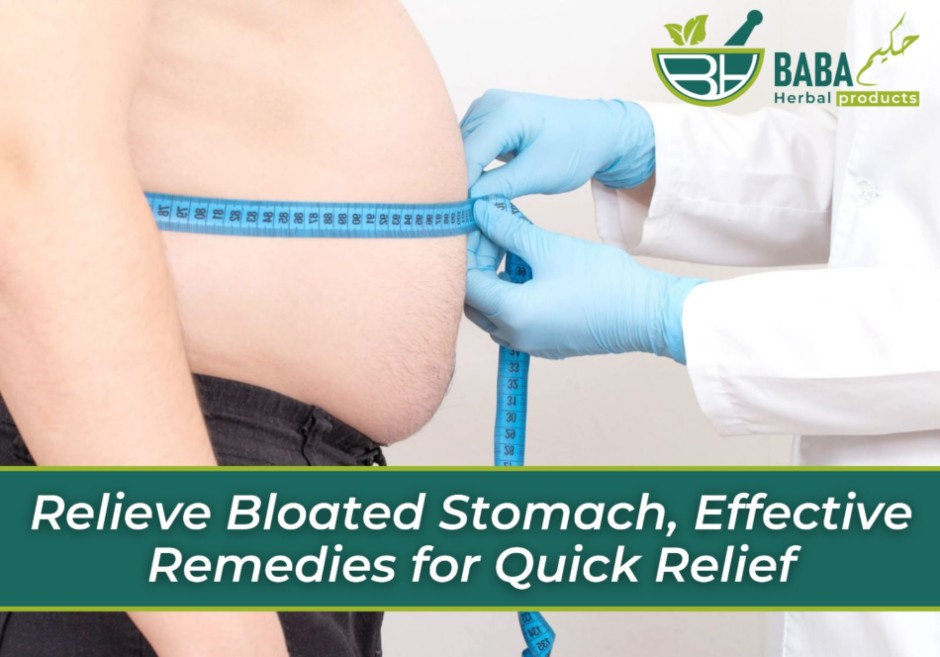Relieve Bloated Stomach, Effective Remedies for Quick Relief

A bloated stomach hurts a lot and feels constricted and full. Even if your abdomen is not swollen, you may still feel bloated. Digestive problems mostly cause bloating, although stress and hormones can sometimes be involved. There may occasionally be a hidden medical issue. What is a Bloated Stomach? First and foremost, a bloated stomach is characterized by a sensation of feeling full, stress, or stiffness in the abdomen. It may or may not be accompanied by a swollen or inflated tummy. It might feel anything from a little uncomfortable to excruciatingly painful. Although it normally fades away with time, some people continue to experience it. Most people with digestive problems get Bloating After Eating. You should consult a doctor to find the source of your swollen stomach if it doesn’t go away. How Common is Bloating After Eating? Excess intestinal gas is the main cause of bloating and stomach discomfort. After eating, if your stomach feels bloated, you could have a digestive problem. An allergy to a particular food or other ailments that cause gas and stomach contents to accumulate might be the culprit, or it could be as easy as overeating too quickly. Yet another prevalent reason for transient bloating is your menstrual cycle. An enlarged stomach may occasionally be a sign of a more serious illness. 10% to 25% of normally healthy individuals report experiencing bloating in their abdomens occasionally. Up to 75% of people say their symptoms range from mild to severe. 10% or so report having it regularly. It might be as high as 90% in those with irritable bowel syndrome (IBS). In women, bloating before and throughout the menstrual cycle affects up to 75% of them. Merely 50% of those experiencing bloating also report having an enlarged abdomen. Possible Bloating Causes There could be multiple bloating causes. Every possible one is explained as follows. Gas Problems An abundance of gas in the gastrointestinal tract is a sign of poor metabolism. Although you can swallow air or consume carbonated drinks to ingest gasses, most of these gasses depart through burp before they enter your intestines. Fermentation, the process by which gut bacteria break down carbohydrates, is primarily responsible for the production of gases in your intestines. Over digesting occurs when too many carbs aren’t normally digested before they reach those gut bacteria, which is the source of excessive fermentation. There might be several explanations for that. Perhaps you just ate a lot too quickly for healthy digestion. Alternatively, you may have a gastrointestinal (GI) illness or a particular dietary intolerance. Among the potential reasons are: Carbohydrate malabsorption Small intestinal bacterial overgrowth Functional digestive disorders Visceral hypersensitivity Digestive Problems These consist of gases, liquids, and solids. When there is a blockage or obstruction in your digestive tract, or when the tissues that move your gut’s materials along are compromised in any way, digestive contents can accumulate in your digestive system. Normal levels of gas will have less capacity to pass through the intestines if there is any accumulation of digestive contents. Additionally, it makes less space in your abdomen for fat and circulatory fluids, which makes everything seem more constricted. The accumulatio n causes can include: Constipation Bowel Obstructions Motility Disorders Recent weight gain More Serious Bloating Causes Periodic bloating is often caused by the digestive system. You may also feel worn out and overall ill from these factors. Your symptoms are usually not worrisome if they ultimately go away. However, you should contact a doctor to rule out other medical problems if your bloated stomach doesn’t go away or grows more severe or if you have other signs. These might consist of: Ascites Pancreatic insufficiency Gastritis (Inflammation of the stomach) Cancer Treatment of Bloated Stomach Ultimately, what gives Gas and Bloating Relief will depend on what’s causing it. To get to the bottom of it, an expert assessment could be necessary. But there are certain solutions you may do if you’re seeking natural ways to reduce stomach bloating today or prevent it tomorrow. Foods that Prevent Gas and Bloating Relief Gas and bloating relief remedies include: Herbal teas with ingredients which include fennel, ginger, chamomile, peppermint, and turmeric can assist with gas production and absorption. Herbal Teas are among one of the best foods that prevent gas and bloating. Capsules containing oil of peppermint are an organic antispasmodic. In other words, they promote gut-muscular relaxation. This can assist you in passing gas and blocked excrement, particularly if your issues stem from a movement problem. Antacids have been demonstrated to help reduce gastric irritation and facilitate easier gastric passage. Simethicone, the active component of antacids, passes gas by clumping tiny gas bubbles collectively. Additionally, simethicone is sold in isolation. Probiotics can support or restore the equilibrium of your gut flora. Some will aid in the absorption of extra gasses, while others can assist you in first digesting your food more effectively. To truly see an improvement, you might need to take them continuously for several weeks or days.
